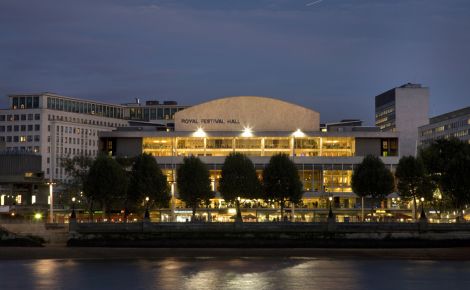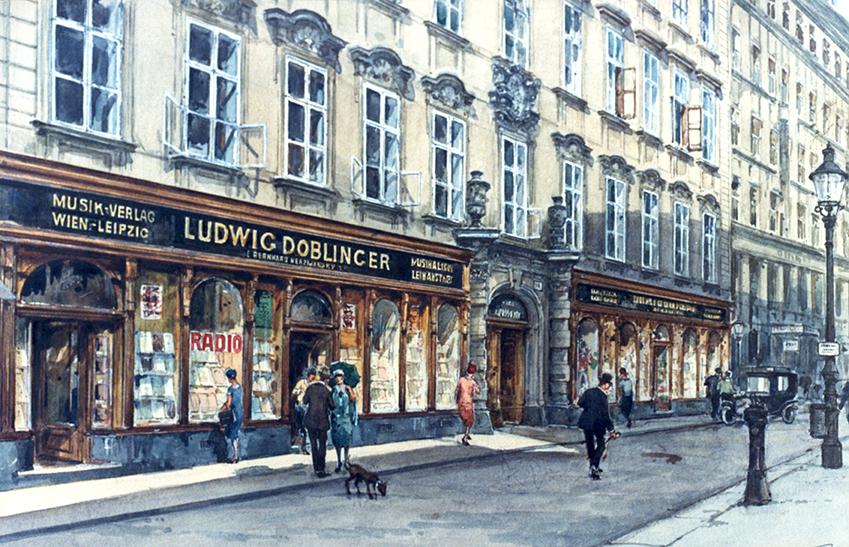Does London still count as a music capital?
NewsWhen the Bavarian State Orchestra announced a tour of European music capitals to mark its 500th anniversary some of us were wondering if London would still make the grade.
What with Brexit, economic crisis, reduced calssical content at the South Bank and the Arts Council’s levelling down, does London still count as a music metropolis?
Just, apparently.
Concerts are planned from September 7 to 23 in Hamburg, Berlin, Bucharest, London, Paris and Vienna. Vladimir Jurowski conducts.






The question is: has Great Britain ever played a significant role in the creation of European classical music?
Impossible to don’t talk about the Barbican. The LSO deserve better. And the charming RAH is a place fantastic for festival not for an all season.
Italy didn’t make the cut.
Russia didn’t make the cut, for obvious political reasons, but truth be told, the Russians played an infinitely greater role than the English in developing classical music.
Czech composers are more important than English composers, but no Slavic country made the cut either.
No Nordic country made the cut.
Rather a lot of cutting.
Sweeping nonsense….Czechoslovakia didn´t produce a relevant composer after Janacek´s death.-And in his time,he was the only one.Martinu´s output is far more variable in quality than Britten`s(and he was the only one in his time,living most of his life outside Czechoslovakia)..Elgar is at least as good as Dvorak,for those who listen(my mom always spoke about music for “grown ups”,against those who listened for cheap thrills..same goes for Sibelius)..)
I wouldn´t like to live without music from any country,because each voice has something unique to tell…..The most interinsting composers of today are from England or Scandinavia,for my money.
Vaughan Wiliams, Tippett, Sullivan, Hamilton Harty, James MacMillan not to forget Benjamin Britten. It was ENO from London that were invited by the Met to put on Gloriana in 1983 to great acclaim with the wonderful Sarah Walker and Neil Howlett. It wasn’t the Met who put it on, and an opera in English! We do things differently in the four different countries of the United Kingdom.
I would argue that Petr Eben and Miroslav Srnka are important composers.
In any case, this whole discussion is idiotic. The answer to the original question is obviously Yes. End of story.
Alas…
Händel may have been German, but his best works are in English, he is an Englishman, and the 3 Viennese classicist colleagues of his appreciated him, and this element.
“Eternal Source of Light Divine” is quite something, in English hands. The less, the more.
https://www.youtube.com/watch?v=ziNf94CFbWE
Yes, with very odd non-idiomatic English and is German underlay of words – just in Messiah alone.
“Very odd non-idiomatic English and is German underlay of words – just in Messiah alone.”
The King James Bible is non-idiomatic English, then.
To each his own.
And let’s not forget Mendelssohn who composed most of his oratorios for English audiences.
The answer is: yes.
Or perhaps: no.
No !
The EU anthem is drawn from a symphony commissioned by London’s Royal Philharmonic Society, for a total of £100.
Quite! Who was it who (reportedly) thought Handel the greatest composer who ever lived? And who was inspired by Handel to write the two greatest German oratorios, The Creation and The Seasons? Could any European city other than London, with its rich, socially diverse and international musical culture, have offered Handel the opportunity to create his many masterpieces?
Actually, Birmingham could and did for Mendelssohn.
My short answer is yes, without any doubt.
– Many outstanding composers from Dunstable through Purcell, i.e. for three centuries.
– At their best, Elgar and Vaughan Williams compare favorably against their continental contemporaries.
– Wonderful folk music tradition, that has also inspired many generations of “classical” composers.
– Great orchestral, choral and educational tradition has had a positive effect well beyond the UK shores.
Henry Purcell. Oh my word, yes.
Yes, well…
John Dowland has remained relevant for 400 years, as beautifully illustrated by
Christian Forshaw’s arrangement of “Me, me and none but me” by John Dowland.
Grace Davidson, an English soprano, demonstrates that there still are sincere singers, who can sing.
(Most music today, loud as it is, regardless of the city, is just noise.)
https://www.youtube.com/watch?v=TRtpzz8BbSg
How can you leave out Thomas Tallis and William Byrd from the list of greatest ever?
Yes, but sadly to ask that question means you are a foreigner, haven’t a clue and don’t understand the culture. Britain, or more correctly the United Kingdom, has had a very big influence not just on European but worldwide. And we have out own fine composers that are performed worldwide.
Clearly you don’t listen to much, if any, UK inspired music. It’s developed along different lines and which make it difficult for continental orchestras and non-native conductors to get right. For enlightend English ears it’s fairly easy to spot.
And as for the supposed superiority of European music, which your post implies, how many European composers whom we admire today weren’t that popular in their lifetime? And how many that were have today been relegated or forgotten?
Yes,very much so.
It is a mental and tabloid sickening in society that something needs to be “the best”, “the biggest” and so on and so on… what simply say London has always been a fantastic city for classical music lovers, and will continue to be so for years to come.
Exactly stated. Excellence can be a shared achievement. Ranking, rating, and the
Reprehensible result of such inane behaviors only contribute to artistic degradation.
Positive comments don’t always go down well here.
Unlike the English musical desert outside London.
That’s the desert that ranges over the BSO, CBSO, Halle, BBC Phil, RNS, Opera North, RLPO, Glyndebourne, most of ETO and on and on is it? Positively arid…
Not to mention the thriving scene of music clubs that exist even in modest sized cities and small towns, often giving the younger generations a much-needed platform to perform in front of the public. In Bedford, for example, last week I went to 9 classical music recitals. Could have gone to at least 3 more, but didn’t have the time due to work commitments. Then there’s the Philharmonia Orchestra, whose oldest residency outside of London is here.
CBSO, Halle, Scottish National ?
It is essential to consider that nationalistic (colonial) dominance and socio-economic constraints were the driving forces behind any cultural development in Europe.
In the Franco-Italo-Austro-Germano-Hungarian and Slavonic parts of Europe, it was the aristocratic courts that, due to their diversity and fragmentation, created a highly competitive landscape which gave birth to the multitude of composers we celebrate today.
Today’s cultural life in the city, however, is merely a reflection of a cultural diversity long past.
Orchestras tour the globe and play Mahler from Tokyo to Toronto.
So why bother who’s the best when confronted with a general decline in cultural diversity?
Spot on!!!!How many great orchestras,ensembles,chamber orchestras,period orchestras,soloists…..And delivering the highest quality against all odds .
Barbican Centre, Sept. 18
Vieru: Écran
Berg: Violinkonzert (w/Renaud Capuçon)
Strauss: Eine Alpensinfonie
Barbican Centre, Sept. 19
Wagner: Vorspiel zu Tristan und Isolde
Schumann: Klavierkonzert (w/Gerhard Oppitz)
Mahler: Symphonie Nr. 4 (w/Louise Alder)
The orchestra is not of course 500 years old. No orchestra is.
After the tour, on Oct. 8, 9 and 11, Kirill Petrenko will the conduct the Bavarian State Orchestra at home in Mahler’s 8th Symphony.
Yes, the year 1523 seems to have been picked in quite an arbitrary manner. They seem to be saying that when Ludwig Senfl “re-organised” the Münchner Kantorei it was a key milestone in the origin story of the Staatsorchester. There are lots of other moments that could have been chosen with equal validity (or lack thereof).
I think England has always had an “inferiority complex” – compared with the likes of Berlin and Vienna. And so the Penguin classical reviews, and top 10 orchestra lists – were like ways of putting the English orchestras out there. And naturally they have their biases. Berlin, Vienna, Chicago – never really needed cheerleading…
I think the answer lies in the quality of the British youth orchestras… if you have talent there, what’s stopping you?
Oh, dear. I don’t believe that it is England with the inferiority complex.
I find it sad each day in the press that everyone remains scared to acknowledge how this all ties back into our Nation’s choice to BREXIT. We foolishly rejected our profound connection to the EU. Before the pandemic, January and February 2020, I recall my local Waitrose shelves beginning to empty of specific imports. And then the pandemic hit and we had “Borie & the Tories” unrelenting convenient blame of all failures on the pandemic. (Classical politics: Look over there!). When in fact our culture sector was already shifting in response to Brexit. ACE warned all institutions of cuts ahead, a freeze on inflation, and so forth. Having sat in Board rooms pre Brexit, I can affirm this from my own meetings with CEOs and the ACE. My larger point: we will always hold a rich cultural capital in real estate alone. But I cannot say I am surprised that finally our subsidized arts sector (and the leadership sector) have been eyeing the American wash-your-own-face model since the 1980’s with desire. We rejected the beauty of EU socialism (and funding of the arts) and EU inclusion for free-wheeling capitalism and delusional notions of National wealth (institutionalized racism, in harsh reality). That our classical music sector is paying the price first only reflects how niche an audience we are. And we act surprised? Reality check, opera is not for everyone. We are a niche art form. We can complain about it ad nausea or start funding the problem ourselves, as the American classical music industry is forced to do. I know many of you won’t like this POV, but when do we stop whining about places like ENO being cut and realize, this is simply the 25 years plan for UK arts? We are choosing a capitalist model over socialism. What did we expect? 25 years now – will not the RSC and NT be funding themselves with commercial fodder – as we see more and more already coming forth. I’m tired of the complaining. We voted for this. If we don’t like it, change the government, change the economy.
And just what has your diatribe to do with the original post?
Actually, given current cultural-political trends, should any city in Western Europe be judged as better or worse, or more important or less important, than cities in, say, the Middle East, Africa, South America, North America, Asia, etc? Isn’t this a form of supremacy?
Regardless, I’m still a bit puzzled why a perhaps apparently Euro-centric blog didn’t give more attention to the opening of the revamped Geffen Concert Hall in NYC’s Lincoln Center. That’s a form of (wait for it) bigotry or Euro (er, white?) supremacy! How dare you!
As for London’s major concert halls, the Barbican and RFH are admittedly both rather non-supremacy. Maybe the city can do some virtue signaling to get a better one.
Can’t be a music capital if you keep getting one-upped by ANY TINY GERMAN TOWN in the race for best sounding acoustical space.
London is with Berlin, Vienna and Munich , the place which can arguably pretend to be THE capital of Orchestra playing in Europe.